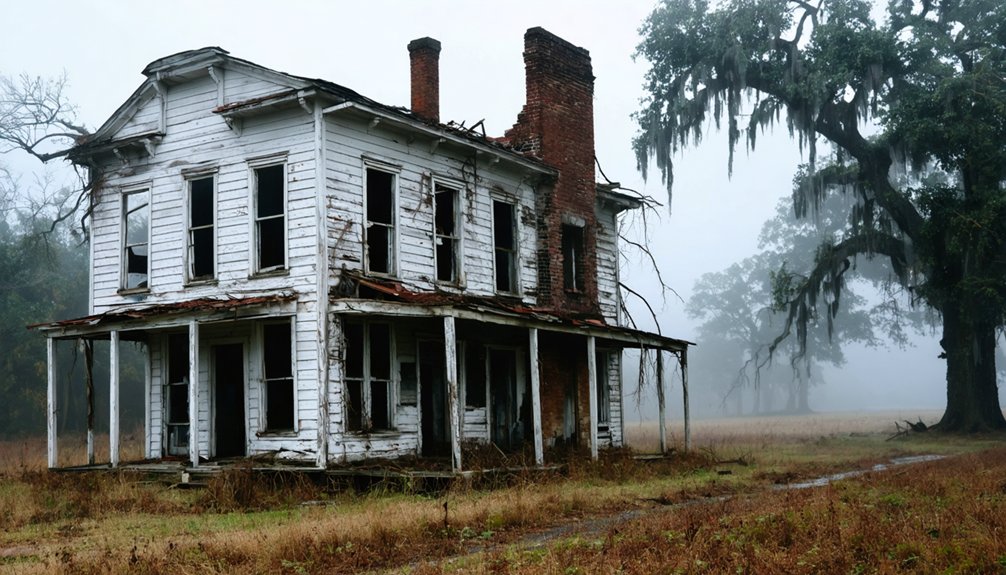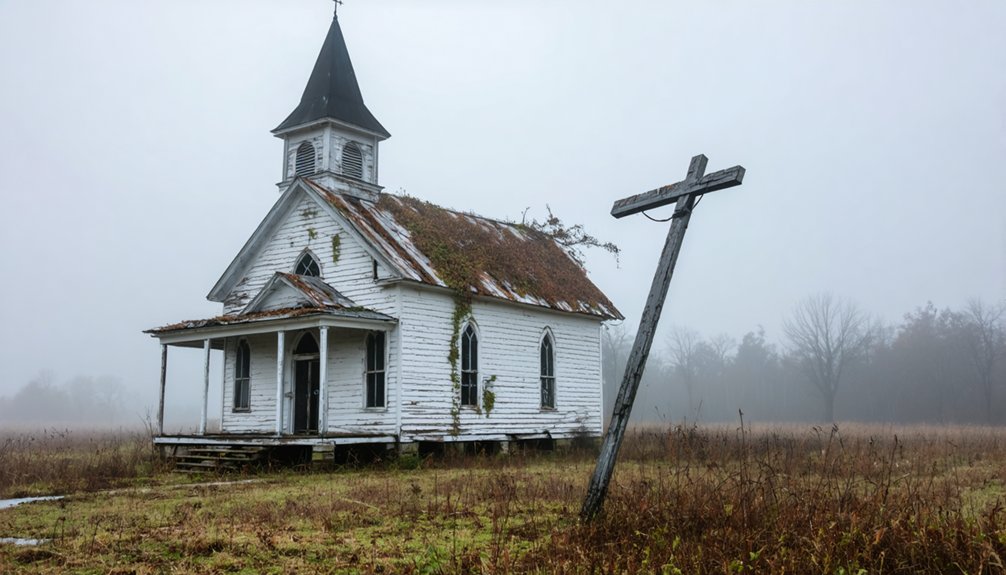You’ll discover Auraria, Georgia’s first gold rush ghost town, between the Chestatee and Etowah Rivers. An 1828 gold discovery at Calhoun Mine transformed this settlement from William Dean’s cabin into a bustling community of 1,000 residents, complete with 20 stores and 15 law offices. Today, you can explore remnants like Woody’s Store and a red brick bank building, where miners once extracted over $20 million in gold during the town’s peak years.
Key Takeaways
- Auraria was Georgia’s first gold rush town, established in 1828 after gold discovery near Calhoun Mine between Chestatee and Etowah Rivers.
- The town rapidly grew to 1,000 residents with over 100 homes, 20 stores, and 15 law offices within months.
- Declining gold deposits and the California Gold Rush of 1849 led to mass exodus, transforming Auraria into a ghost town.
- Poor soil conditions and lack of railroad access prevented economic diversification, causing businesses and residents to abandon the town.
- Today, only Woody’s Store and a brick bank building remain as visible remnants of this once-thriving gold rush settlement.
The Birth of Georgia’s First Gold Rush Town
Three key events in 1828 sparked Georgia’s first gold rush: the discovery of gold near the future Calhoun Mine, the establishment of William Dean’s cabin as an initial settlement point, and Nathaniel Nuckolls’ creation of the area’s first tavern and hotel.
You’ll find this remarkable gold discovery predated California’s famous rush by two decades, occurring on sovereign Cherokee land between the Chestatee and Etowah Rivers. The location proved ideal for placer mining due to its abundant water sources.
As word spread, the settlement quickly transformed from “Deans” to “Nuckollsville” before John C. Calhoun dubbed it “Auraria,” meaning gold in Latin. By 1832, the population swelled to 1,000, drawing a diverse mix of miners, merchants, and frontier settlers. The town soon boasted The Western Herald newspaper among its thriving businesses. The discovery was made by Benjamin Parks while hunting deer on his birthday.
This rapid expansion, known as the “Great Intrusion,” ultimately led to Cherokee displacement through the Indian Removal Act of 1830.
Life in Early Auraria’s Boom Years
While gold fever gripped the newly established town of Auraria in 1832, its population swelled to 1,000 residents within months as miners, merchants, and families carved out a bustling frontier community.
The social dynamics reflected a raw, untamed spirit where fortune-seekers and entrepreneurs built a vibrant mining culture. You’d find:
- 18-20 stores and multiple taverns serving the daily needs of miners
- About 100 family homes springing up within six months
- 12-15 law offices managing claims and disputes
- Four to five taverns where miners gathered to share news and drinks
- A temporary courthouse that sparked rivalry with nearby Dahlonega
Life centered around gold mining along the Etowah River, while merchants, lawyers, and innkeepers provided essential services. The town’s name itself reflected its purpose, as Auraria means gold in Latin.
Though often chaotic, this freedom-loving community embodied the ambitious spirit of America’s frontier. This early mining settlement would eventually become part of Lumpkin County, Georgia, where it stands today.
Mining Operations and Economic Growth
The discovery of gold at Calhoun Mine in 1828 sparked a mining boom that transformed Auraria into America’s first major gold rush destination. You’d have found numerous mining operations along the Etowah River, including Battle Branch, Barlow, and Gold Hill mines, all employing various mining techniques to extract the precious metal.
The economic impact was staggering. Within six months of the 1832 Gold Lottery, Auraria exploded with over 100 homes, 20 stores, and 15 law offices. The population soared to 1,000, while 10,000 people worked in surrounding mining activities.
Between 1829-1839, miners extracted $20 million in gold from Cherokee lands. To support this wealth, Nathaniel Nuckolls built essential infrastructure including a tavern and hotel, while the town’s strategic location near water sources fueled its rapid growth. The establishment of a mint in Dahlonega in 1838, influenced by John C. Calhoun, further legitimized the region’s gold production.
The Path to Abandonment
Despite initial prosperity, Auraria’s decline began as gold deposits steadily dwindled throughout the 1830s.
Mining exhaustion at major sites like Barlow and Battle Branch triggered a devastating chain reaction that you’d recognize as the classic boom-to-bust pattern. The population decline accelerated when the California Gold Rush of 1849 lured away miners and families, including the influential Russell brothers. Tales persist of lost Auraria gold that prospectors never found before abandoning the town. The once-bustling town that supported eighteen stores gradually faded into obscurity.
- Poor soil made farming impossible as an alternative livelihood
- Lack of railroad access isolated the town from trade opportunities
- Transfer of county offices to Dahlonega stripped administrative importance
- Abandoned buildings multiplied as businesses and services disappeared
- Failed attempts at economic diversification couldn’t stem the exodus
Without transport infrastructure or agricultural potential, you’ll see how Auraria couldn’t sustain itself once the gold ran out.
Present-Day Remnants and Historical Legacy
Standing among the few remaining structures of Auraria’s once-bustling streets, Woody’s Store and a red brick bank building serve as enduring witnesses to the town’s gold rush heritage.
During the town’s heyday, an astounding over $20 million in gold was extracted from the surrounding area.
The architectural significance of these buildings, along with the Graham Hotel ruins and scattered foundations, creates a physical timeline of Auraria’s peak years. You’ll find historical markers along Gold Diggers’ Road detailing the town’s pivotal role in America’s first gold rush.
While Auraria itself maintains a quiet, undeveloped atmosphere, its tourism impact extends to nearby Dahlonega, where you can visit gold-mining sites and museums. Today, visitors can experience the town’s history through video playback featuring detailed historical accounts and virtual tours.
Archaeological excavations continue to uncover artifacts from daily life, and researchers study the site’s transformation from Cherokee land to boomtown. The old cemetery and church grounds offer a solemn reminder of the community that once called this ghost town home.
Frequently Asked Questions
What Role Did Native Americans Play in Discovering Gold in Auraria?
You’ll find Native tribes didn’t directly discover gold, but their Cherokee Nation lands became the site where settlers first found gold, sparking the rush that’d lead to their tragic forced removal.
Were There Any Notable Crimes or Lawlessness During Auraria’s Gold Rush?
You’ll find few specific crime statistics, but Auraria faced typical gold rush lawlessness incidents with gambling, theft, claim jumping, and tavern brawls flourishing amid the chaotic mix of miners and opportunists.
How Did Women Participate in Auraria’s Mining Community?
Like pillars holding up a gold mine, women’s roles were essential – you’d find them running boarding houses, managing local trade, organizing community meetings, and sustaining families while men worked the mines.
What Happened to the Wealth Accumulated by Successful Auraria Miners?
You’ll find successful miners’ wealth distribution varied – they invested in Western ventures like Colorado’s boom towns, poured money into manufacturing businesses, or simply took their fortunes westward seeking California’s gold fields.
Did Any Famous Historical Figures Visit Auraria During Its Peak?
While many travelers came and went, you’ll be interested to know Vice President John C. Calhoun was Auraria’s most famous visitor, staying at Agnes Paschal’s hotel while overseeing his nearby mining operations.
References
- https://en.wikipedia.org/wiki/Auraria
- https://www.hhhistory.com/2025/10/auraria-georgias-gold-rush-ghost-town.html
- https://aandrcommunities.com/auraria-georgia-the-oldest-neighborhood-in-denver-colorado/
- https://sites.rootsweb.com/~galumpki/history/Auraria_byAB.htm
- https://www.georgiahistory.com/ghmi_marker_updated/auraria/
- https://www.ghosttowns.com/states/ga/auraria.html
- https://www.atlsherpa.com/p/real-ghost-town-with-an-unreal-story
- https://vanishinggeorgia.com/category/auraria-ga/
- https://freepages.history.rootsweb.com/~gtusa/usa/ga/auraria.htm
- https://lisamrussell.substack.com/p/auraria-georgias-golden-ghost-town



